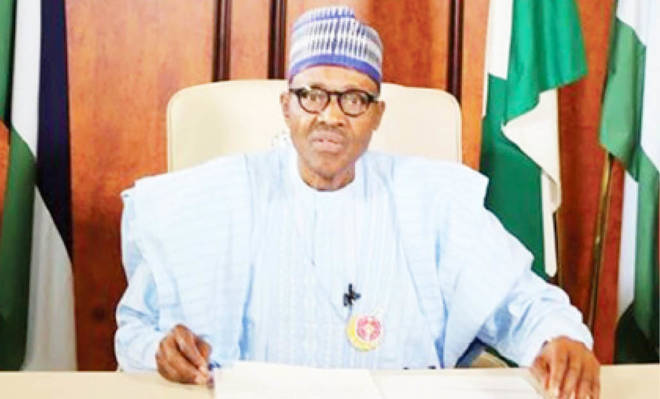
People have asked why I have never subjected President Muhammadu Buhari’s English to the crucible of grammatical analysis like I did former President Goodluck Jonathan’s on several occasions. There are two reasons for this. One, being a PhD and a former lecturer at a higher education institution, Jonathan came to the Nigerian presidency with an intellectual capital that no president or head of state before him had. This fact raised expectations that he would be a model of grammatical and rhetorical felicity in his communication in English.
Buhari, on the other hand, came to the Nigerian presidency in 2015 with perhaps the lowest intellectual cachet of any president in recent memory. There are doubts that he ever sat for a school certificate exam. Even his zealous supporters famously said, in the run-up to the 2015 election, that even if all he had to present as his educational qualification were a NEPA bill, they would still vote for him, indicating that intellectual vitality wasn’t one of the expectations they had of him. So pointing out the grammatical errors of someone who wasn’t even expected to speak grammatically correct English by both his admirers and critics is a waste of time.
The second reason is that Buhari actually speaks far better English than Jonathan does. In spite of Jonathan’s high credentials, his spoken English falls short of the standards expected of an average secondary school student. He does not understand rudimentary rules of subject-verb agreement that most people learn in junior secondary school, has trouble with tenses, and can’t seem to be able to speak basic idiomatic English. (To see where I chronicled Jonathan’s troubles with the English language during his presidency, read my April 16, 2010 column titled, “Dr. Goodluck Jonathan, that was Embarrassing!”; my January 27, 2013 column titled, “President Goodluck Jonathan’s Grammatical Boo-boos”; and my January 18, 2015 column titled, “President Jonathan’s Awkward Grammatical Miscues on the Campaign Trail”).
In spite of appearances to the contrary, Buhari speaks decent English. If you get past his heavily Hausa-inflected English accent, you will find that his syntax is almost perfect and that he speaks impressive idiomatic English. He has occasional troubles with consistency in using the past tense to describe past events, but that’s an issue that most nonnative English speakers struggle with. So, ironically, the man who came to the presidency with the least intellectual cachet speaks better English than a man who has the distinction of being Nigeria’s most credentialed president.
Democracy Day grammatical bloopers
Nevertheless, it is apparent that facility with proper grammar isn’t the forte of the president’s speechwriters. Nor is a concern for memorable, inspiring, and elegant prose. The speech the president delivered on May 29 was peppered with embarrassing grammatical errors, avoidable stylistic ugliness, sleep-inducing turns of phrase, and mind-numbing platitudes. I point out some of them below:
1. “Our nascent democracy.” In the very first sentence of the speech, the president referred to Nigeria’s 19-year-old democracy as “nascent.” That’s an inexcusable misuse of the word. Nascent means “beginning.” No one in his right mind would describe a nearly two-decade-old political system as “beginning.” “Our nascent democracy” is a stereotyped, clichéd expression that Nigerian politicians have been enamored with for years; they don’t want to let go of it even when it no longer makes sense. Clichés are overused, ready-made expressions that save intellectually lazy people the trouble of thinking. But it’s time to retire that maggoty expression to the verbal garbage where it properly belongs.
2. Inconsistent capitalization: The president’s speechwriters demonstrated the capitalization skills of a lower-level elementary school kid. It’s impossible to point out all the capitalization errors in the speech. In some places, “administration” is written with an upper-case “A” and in others with a lower-case “a.” “Change” is capitalized in the middle of sentences. So are “Anniversary,” “Government,” “Local Governments,” “Organizations,” “IDP Camps,” “International Community,” “the Elders,” “Billions,” etc. Well, the basic rule for capitalization is that only proper nouns are capitalized. Common nouns are never capitalized unless they begin a sentence.
3. “Naira” shouldn’t be capitalized, either. Throughout the speech, the president’s speechwriters capitalized “naira.” But currency names are never capitalized unless they begin a sentence. It should be, “billions of naira,” “millions of dollars,” “several euros,” etc., not “billions of Naira,” “millions of Dollars,” “several Euros,” etc. When specific amounts are mentioned, as was the case in the Democracy Day speech, use the symbol of the currency.
4. Subject-verb disagreement. In at least one place in the speech, the subject of a sentence disagrees with its verb. Look at this sentence, for example: “The unfortunate incidences of kidnappings, herdsmen and farmers clashes in several communities which have led to high number of fatalities and loss of properties across the country is being addressed and the identified culprits and their sponsors shall be made to face the full wrath of the law.”
The subject of this sentence is, “The unfortunate incidences of kidnappings, herdsmen and farmers clashes in several communities.” That is clearly a plural subject. But the verb that follows the subject in sentence is the singular “is”! If you strip the sentence of its appurtenances, you would have, “The unfortunate incidences is being addressed.” The proper verb should be “are,” not “is” since the subject is “incidences.” Plural subjects should agree with plural verbs and singular subjects should agree with singular verbs.
By the way, “the full wrath of the law” isn’t a Standard English expression. I have no space to expound it, but people who are interested in the origin of the expression should read my June 26, 2016 column titled, “‘Face the Full Wrath of the Law’: Q and A on Nigerian, American and British English.”
5. “Amnesty of forgiveness.” The president said, “The Voluntary Asset and Income Declaration Scheme (VAIDS) aimed at expanding tax education and awareness has offered the opportunity for tax defaulters to regularise their status in order to enjoy the amnesty of forgiveness on overdue interest, penalties and the assurance of non-prosecution or subject to tax investigations.” What in the world is “amnesty of forgiveness”? Amnesty itself means forgiveness, so VAIDS makes tax defaulters enjoy “forgiveness of forgiveness”?
6. Punctuation. The president’s speechwriters obviously don’t know the function of a semi-colon. They think it’s used to introduce a list. Well, that is what a colon does.
7. Other avoidable errors in the speech are, “loans had been disbursed to 4,822 societies in the 36 States and FCT, while another 370,635 are awaiting release of funds.” Use “had” only when an action has been completed in the past and has no effect in the present. Example: “In 1960, loans had been disbursed to 3,000 women.” That’s evidently not the case here. So it should have been, “loans have been disbursed.”
The definite article “the” has also been misused in many places in the speech such as, “in order to sustain the international best practices and ensure safety and security” and “by the Boko Haram.” The definite article is unneeded in both phrases.
Finally, “private-owned Universities” should be “privately-owned universities” (in American English, it would be “privately owned universities”; note the absence of a hyphen between “privately” and “owned”), “hitch free elections” should be “hitch-free elections,” and “violence free process” should be “violence-free process.” The last two examples are what grammarians call compound modifiers or compound adjectives. They are groups of words, always joined by a hyphen, that modify the nouns that come after them. For instance, “violence-free” is a compound adjective that modifies “process.”
Why this matters
Presidents, by virtue of the enormous symbolic power they wield, have an outsize influence on grammar and usage. Their errors can become new norms and can confuse people who look up to them for guidance. Most importantly, important presidential speeches, such as the Democracy Day speech, often outlast their time.
That is why speechwriters invest time and energy into making them remarkable, quotable, and fitting. Incidentally, last week, President Donald Trump’s two letters (one to the leader of North Korea and the other to a retired high school teacher) were the subject of vicious critiques and parsing by American grammarians and journalists. So Buhari is in “good” company.

 Join Daily Trust WhatsApp Community For Quick Access To News and Happenings Around You.
Join Daily Trust WhatsApp Community For Quick Access To News and Happenings Around You.


